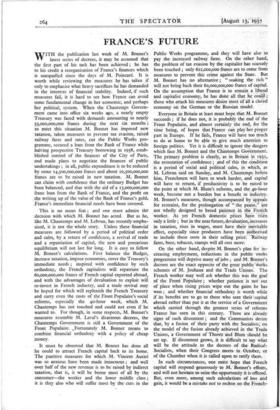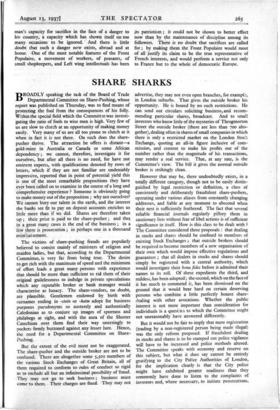FRANCE'S FUTURE
WITH the publication last week of M. Bonnet's latest series of decrees, it may be assumed that the first part of his task has been achieved ; he has to his credit a reorganisation of France's finances which is unequalled since the days of M. Poincare. It is worth while reviewing the measures he has taken if only to emphasise what heavy sacrifices he has demanded in the interests of financial stability. Indeed, if such measures fail, it is hard to see how France can avoid some fundamental change in her economic, and perhaps her political, system. When the Chautemps Govern- ment came into office six weeks ago, a nearly empty Treasury was faced with demands amounting to nearly 33,000,00%0o° francs during the next six months to meet this situation M. Bonnet has imposed new taxation, taken measures to prevent tax evasion, raised railway fares and rates, cut the Public Works pro- gramme, secured a loan from the Bank of France while halving prospective Treasury borrowing in 1938, estab- blished control of the finances of the City of Paris, and made plans to negotiate the finances of public undertakings ; in all, public expenditure is to be reduced by some 14,5oo,000,000 francs and about 1o,500,00o,000 francs are to be raised in new taxation. M. Bonnet can claim with confidence that the ordinary Budget has been balanced, and that with the aid of a 15,o0o,000,o0o franc loan from the Bank of France, and the profit on the writing up of the value of the Bank of France's gold, France's immediate financial needs have been covered.
This is no mean feat ; and one must admire the decision with which M. Bonnet has acted. But as he, like M. Chautemps and M. Lebrun, has recently empha- sised, it is not the whole story. Unless these financial measures are followed by a period of political order and calm, by a return of confidence, a revival of trade and a repatriation of capital, the new and precarious equilibrium will not last for long. It is easy to follow M. Bonnet's calculations. First balance the Budget, increase taxation, impose economies, cover the Treasury's immediate needs ; inspired with confidence by such orthodoxy, the French capitalists will- repatriate the 6o,000,000,000 francs of French capital exported abroad, and with the advantages of devaluation to exploit will re-invest in French industry, and a trade revival may be hoped for which will replenish the French Treasury and carry even the costs of the Front Populaire's social reforms, especially the 4o-hour week, which M. Chautemps has not touched and could not even if he wanted to. For though, in some respects, M. Bonnet's measures resemble M. Laval's disastrous decrees, the Chautemps Government is still a Government of the Front Populaire. _Fortunately M. Bonnet means to combine financial orthodoxy with a policy of cheap money.
It must be observed that M. Bonnet has done all he could to attract French capital back to its home. The punitive measures for which M. Vincent Auriol was so anxious have been made innocuous ; and well over half of the new revenue is to be raised by indirect taxation, that is, it will be borne most of all by the consumer—the worker and the lower middle class ; it is they also who will suffer most by the cuts in the Public Works programme, and they will have also to pay the increased railway fares. On the other hand, the problem of tax evasion by the capitalist has scarcely been touched ; only 622,000,000 francs are to come from measures to prevent this crime against the State. But M. Bonnet has no alternative ; " soaking the rich " will not bring back their 6o,000,000,000 francs of capital. On the assumption that France is to remain a liberal and capitalist economy, he has done all that he could ; those who attack his measures desire most of all a cl&ed economy on the German or the Russian model.
Everyone in Britain at least must hope that M. Bonnet succeeds ; if he does not, it is probably the end of the Front Populaire, and almost certainly the end, for the time being, of hopes that France can play her proper part in Europe. If he fails, France will have too much to do at home to be able " to give much attention to foreign politics. Yet it is difficult to ignore the dangers which face M. Bonnet and the Chautemps GoVernment. The primary problem is clearly, as in Britain in 1931, the restoration of confidence ; and of this the condition is a period of social and political calm, in which, as M. Lebrun said on Sunday, and M. Chautemps before him, Frenchmen will have to work harder, and capital will have to return, if productivity is to be raised to the point at which M. Bluin's reforms, and the 40-hour week, become not a burden but a benefit to industry. M. Bonnet's measures, though accompanied 'by appeals for restraint, for the prolongation of " the pause," are not wholly designed to breed patience in the French 'worker. As yet French doniestic prices haVe risen only a little ; but in the near future, devaluation, increases in taxation, rises in wages, must have their inevitable effect, especially since producers have been authorised to include these costs in their selling price. "Railway fares, beer, tobacco, stamps will all cost more.
On the other hand, despite M. Bonnet's plan for in- creasing employment, reductions in the public- works programme will deprive many of jobs ; and M. Bonnet's decrees are the exact opposite of the great public 4c irks schemes of M. Jouhaux and the Trade Unions: The French worker may well ask whether this was the goal of the Front. Populaire ; whether patience is not out of place when rising prices wipe out the gains he has won ; and whether financial orthodoxy is worth while if its benefits- are to go to those who sent their 'capital abroad rather than put it at the service of a GovernMent which carried through the greatest series of reforms France has seen in this century. There are already signs of such discontent ; and the Communists desire that, by a fusion of their party with the Socialists, on the model of the fusion already achieved in the' Trade Unions, a Government of Thorez and Blum should be set up. If discontent grows, it is difficult to say what will be the attitude to the decrees of the Radical- Socialists, when their Congress meets in October, or of the Chamber when it is called upon to ratify them.
In such circumstances, one must hope that French capital will respond generously to M. Bonnet's efforts, and will not -hesitate to seize the opportunity it is-offered. But, even more, among such calculations of loss and gain, it would be a mistake not to reckon on the French- man's capacity for sacrifice in the face of a danger to his country, a capacity which has shown itself on too many occasions to be ignored. And there is little doubt that such a danger now exists, abroad and at home. One of the most notable features of the Front Populaire, a movement of workers, of peasants, of small shopkeepers, and Left wing intellectuals has been its patriotism ; it could not be shown to better effect now than by the maintenance of discipline among its followers. There is no doubt that sacrifices are called for ; by making them the Front Populaire would most of all justify its claim to be the true representative of French interests, and would perform a service not only to France but to the whole of democratic Europe.







































 Previous page
Previous page